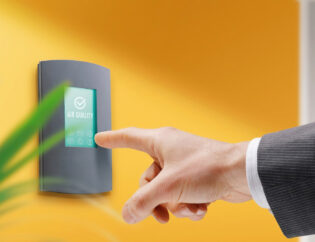
Across the United States, sustainability is gaining momentum as a key priority impacting all industries. With a focus on energy efficiency, waste reduction, and environmental stewardship, sustainability initiatives are driving significant changes in how facilities are managed and maintained.
Business owners or managers who do not adopt green practices may face economic concerns, uncertainty around regulations and incentives, and/or lack of awareness about the benefits of carbon-reduction.
With this top of mind, we have outlined five noteworthy initiatives that support facility managers to reach their sustainability goals:
US Green Building Council (USGBC) and LEED Certification:
The USGBC’s Leadership in Energy and Environmental Design (LEED) certification program is a widely recognized standard for green building design, construction, and operation. LEED-certified buildings prioritize energy efficiency, water conservation, and indoor air quality. Facility services companies like IONFS play a crucial role in achieving and maintaining LEED certification by implementing efficient energy systems, green cleaning protocols, and waste reduction strategies.
ENERGY STAR Program:
Administered by the U.S. Environmental Protection Agency (EPA) and the Department of Energy (DOE), the ENERGY STAR program helps businesses and individuals save money and protect the environment through energy-efficient practices. Facility managers can leverage ENERGY STAR tools and resources to benchmark energy performance, identify energy-saving opportunities, and implement strategies to reduce energy consumption and greenhouse gas emissions.
Waste Management and Recycling Initiatives:
Across the U.S., cities and states continue to implement waste management and recycling initiatives to divert waste from landfills and promote recycling and composting. Facility services providers play a vital role in managing waste within commercial and institutional buildings by implementing recycling programs, conducting waste audits, and educating building occupants about proper waste sorting and disposal practices. By prioritizing waste reduction and recycling, facilities can minimize their environmental footprint and support a more circular economy.
Green Building Codes and Standards:
Many states and municipalities in the U.S. have adopted green building codes and standards to promote sustainable construction and renovation practices. These codes often include requirements for energy efficiency, water conservation, and indoor environmental quality. At IONFS, we stay informed about these codes and standards to ensure compliance and implement sustainable building practices that align with regulatory requirements.
Renewable Energy and Carbon Reduction Goals:
With growing concerns about climate change, many U.S. businesses and organizations are setting ambitious goals to reduce carbon emissions and transition to renewable energy sources. We support these efforts by helping clients implement renewable energy systems such as solar panels, wind turbines, and geothermal heating and cooling systems. By investing in renewable energy and carbon reduction initiatives, business owners can mitigate their environmental impact and contribute to a more sustainable future.
These sustainability initiatives are driving innovation and progress in the facility services industry. By embracing initiatives such as LEED certification, ENERGY STAR, waste management programs, green building codes, and renewable energy goals, we all play a pivotal role in advancing sustainability and building a greener, more resilient future.
Be sure to ask us how we work with our clients to promote positive environmental, social, and economic outcomes.

